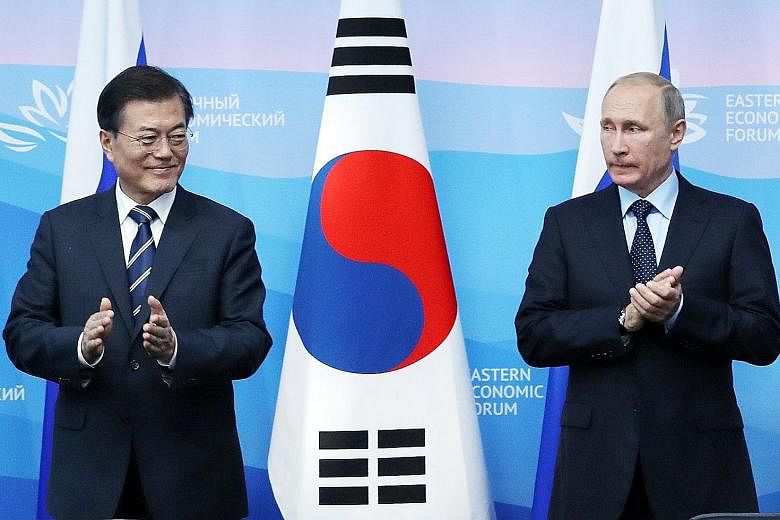South Korean President Moon Jae In and his Russian counterpart Vladimir Putin have called for more efforts to stop North Korea's provocations as soon as possible.
But Mr Putin said sanctions and pressure alone are not the solution, appearing to reject Mr Moon's request for help to pressure the North with more sanctions, including cutting off its oil supplies.
"We should not succumb to emotions and drive North Korea into a corner," Mr Putin said at a joint press conference, reiterating concerns that an oil ban would hurt ordinary North Koreans.
Russia exports about 40,000 tonnes of crude oil to North Korea a year, said Mr Putin, compared with about 520,000 tonnes a year from China, said industry sources.
The two leaders held a summit yesterday in the eastern Russian city of Vladivostok, three days after North Korea claimed it tested a missile-ready hydrogen bomb. This marks the regime's sixth nuclear test and follows a flurry of missile tests, including two intercontinental ballistic missiles fired in July.
There will be more of such "gift packages" targeting the US if it continues to pressure Pyongyang, the regime's United Nations envoy Han Tae Song said on Tuesday.
South Korea's Unification Ministry also warned of more activity from the North yesterday.
To counter the North's threat, South Korea's Defence Ministry will install four remaining launchers of the US Terminal High Altitude Area Defence (Thaad) missile shield at its Seongju base today, despite protests from residents and an ongoing environmental impact assessment.
China yesterday demanded that the Thaad deployment stop immediately, arguing that it would add to tensions. "China is seriously concerned," said Foreign Ministry spokesman Geng Shuang.
Early on Tuesday, China held a drill where a ground unit shot down simulated missiles over Bohai Bay, across from the Korean peninsula.
Meanwhile, US President Donald Trump and British Prime Minister Theresa May urged China to do more to deter the North. In a phone call, they agreed to use "all the leverage" they have to stop the North from pursuing its nuclear activities.
Mr Trump also spoke to Australian Prime Minister Malcolm Turnbull, who told Parliament after his call that he agreed with the United States President that "now is the time to exert the maximum diplomatic and, above all, economic pressure on North Korea to bring this reckless and dangerous regime to its senses".
The US seeks the strongest possible sanctions against North Korea, but is opposed by Russia and China.
US officials and experts worry that Mr Putin's "unhelpful efforts" are driven by a "perennial quest to boost Russian prestige and leverage at the expense of America", said The Washington Post.
Mr Putin, in his meeting with Mr Moon, brought up the China-Russia "double freeze" initiative calling on the US and South Korea to freeze their joint military exercises in return for North Korea freezing its nuclear and missile programme. He said the plan - rejected by Washington and Seoul - offers "a real way of decreasing tensions".
But Dr Go Myong Hyun from The Asan Institute for Policy Studies said the two allies would never agree to exchange their sovereign right to self-defence for "something illegal".
If they relent, he said, it would show that Pyongyang's strategy of using tension and provocations to shake their alliance has worked. "If that's the case, eventually, the talk is going to be about North Korea's status as a nuclear state and not about denuclearisation," he said.
Meanwhile, South Korean Defence Minister Song Young Moo and his Japanese counterpart Itsunori Onodera affirmed close bilateral cooperation against the North in a phone call yesterday, agreeing to work with the US to immediately enforce upcoming UN resolutions.
Just as calls grow in South Korea for it to go nuclear against the North, policymakers in Japan are starting to question if it should reconsider its non-nuclear pledge.
A senior Japanese defence policymaker told Reuters that allowing a nuclear-armed US submarine to operate from one of the US bases in Japan would anger China and push it to do more to curb the North.
SEE OPINION

